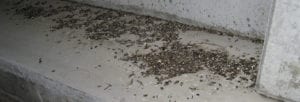
by Pigeon Patrol | Feb 16, 2020 | Animal Deterrent Products, Bird Deterrent Products, Bird Netting, Pigeon Droppings, Pigeon Patrol's Services, Pigeon Spikes, UltraSonic Bird Control
Pigeons problems have devastating effects on the heating and cooling components and indoor air quality of a commercial facility. Pigeon problems affect employees, maintenance personnel and potentially customers through the HVAC system.
HVAC Systems Make Perfect Pigeon Coups
Unfortunately, rooftop heating and cooling units are a perfect place for pigeons to nest. To seek shelter from the elements, pigeons typically enter air handler units through the fresh air intakes and build their nests within the HVAC unit. A single pair of pigeons can generate up to 18 new pigeons per year. Once a nest is established, pigeons are extremely territorial.
Indoor Air Quality
An HVAC system distributes the air throughout a facility. The bacteria, fungi and parasites that live and grow in pigeon droppings can carry and transmit any of 60 known diseases. Exposure to pigeon feces and other organic matter such as feathers carcasses and nesting material from the HVAC system may pose a considerable health threat to people who come in contact with them or inhale the airborne particles from them. Every precaution should be taken to ensure that building occupants and maintenance personnel are protected from pigeon feces.
Damage to HVAC Systems
As pigeons live in the air handler units they peck through filter material allowing unfiltered air and pigeon contaminants to freely enter the ventilation system. There are numerous damaging problems to an HVAC system from pigeon.
- Filter banks: Pigeons peck though filter banks allowing for unfiltered air and pigeon contaminants to be drawn into HVAC components and supply air ducts.
- Fan Blower: Pigeon debris builds within the fan blades decreasing airflow.
- Air conditioner coils: Pigeon debris compacts within air conditioner coils and clogs the drain pan.
- Insulation: Pigeons peck at insulation to create nesting material allowing for raw fiberglass fibers to enter the airstream.
How Do You Correct Pigeon Problems?
Hire a professional wildlife service or animal control contractor to relocate existing pigeons, and install devices to prevent future intrusions. Have the pigeon debris removed by a professional air duct cleaning contractor. Be sure to have the air duct cleaning contractor inspect the supply air ducts downstream of the HVAC unit.
Source
At Pigeon Patrol, we manufacture and offer a variety of bird deterrents, ranging from Ultra-flex Bird Spikes with UV protection, Bird Netting, 4-S Gel and the best Ultrasonic and audible sound devices on the market today.
Contact us at 1- 877– 4– NO-BIRD, (604) 585-9279 or visit our website at www.pigeonpatrol.ca
Bird Gone, Pigeon Gone, Seagull Gone, Pigeon issue, pigeon spikes, 1-877-4NO-BIRD, 4-S Gel, Bird Control, Pigeon Control, bird repellent, Bird Spikes, sonic bird repellent, stainless steel bird spikes, bird spikes Vancouver, Ultra Sonic Bird Control, Bird Netting, Plastic Bird Spikes, Canada bird spike deterrents, Pigeon Pests, B Gone Pigeon, Pigeon Patrol, pest controller, pest control operator, pest control technician, Pigeon Control Products, humane pigeon spikes, pigeon deterrents, pigeon traps, Pigeon repellents, Sound & Laser Deterrents, wildlife control, raccoon, skunk, squirrel deterrent, De-Fence Spikes, Dragons Den, Canada bird spikes, Canada pigeon, pigeon control, pigeon patrol, pigeon. Kill pigeons, crow, starling
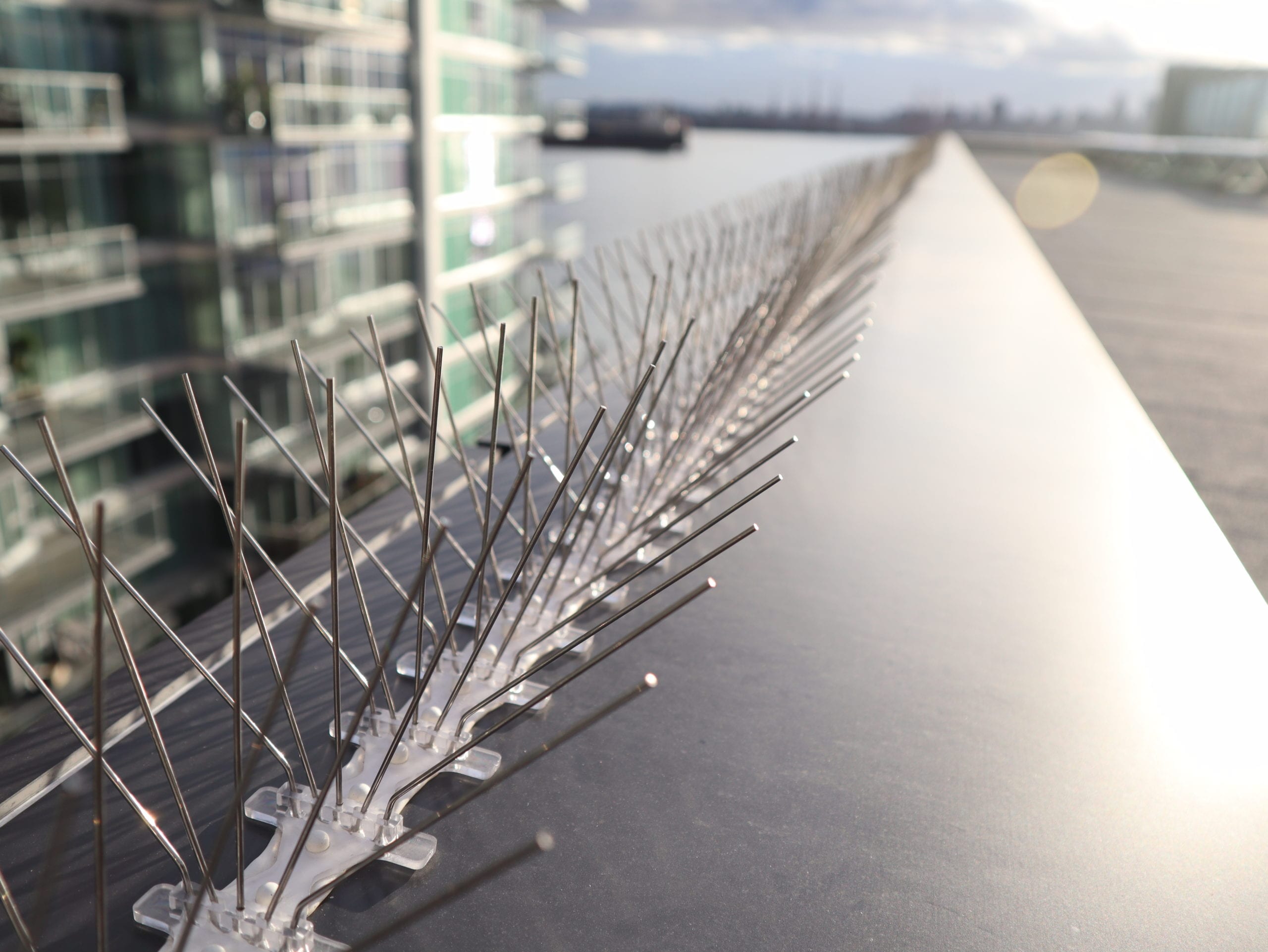
by Pigeon Patrol | Feb 16, 2020 | Animal Deterrent Products, Bird Deterrent Products, Bird Spike, Pigeon Control, Pigeon Droppings, Pigeon Patrol's Services, Pigeon Spikes, Pigeons in the News
Neighbors said they’ve done everything they can think of to get this pigeon problems to stop in their Rhawnhurst neighborhood.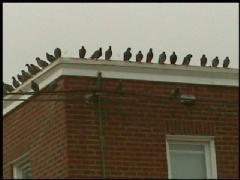
They’ve signed petitions. They’ve helped the City of Philadelphia take the case to court.
And still, every day, to put it bluntly, they’re pooped on by pigeons that flock there daily. That’s why they called the NBC 10 Investigators.
They wait on the wire.
“It’s disgusting,” said neighbor Eleanor Hennessy.
To neighbors, it feels like a nightmare scene right out of the old Alfred Hitchcock movie, “The Birds”,but Pigeon.
One look at the deposits left on an NBC 10 News car gives an idea what all of the screaming is about.
“It’s a crime against us,” said Hennessy’s husband, Francis.
And it has been going on for years.
“We’re out there every day washing our cars. Our dogs are getting pooped on, literally,” Cinque said.
“We couldn’t eat in our yard all summer. Kids next door couldn’t swim in their pool. You can’t hang laundry,” Francis Hennessy said.
“I’m working on a story about the pigeons,” said NBC 10’s Lu Ann Cahn as she approached.
“Oh, look, leave me alone. Go away,” said Karen Partain.
Partain owns the Rhawnhurst row home that has become the pigeon palace on Hartel Avenue.
Her husband, Joe Mutoli, wouldn’t answer the door. City health officials said despite six citations, Mutoli has continued to illegally put out a virtual bird buffet.
A seventh citation was delivered while NBC 10 was there.
Cahn said she was told there’s nothing wrong with a bird feeder. But the city said Mutoli has been told numerous times that he’s not allowed to throw feed on the ground and in a public school yard behind his home.
“His response has been that this is something he can do, and also there has been a lot of confrontation with our officers,” said Tara Derby, of the Philadelphia Animal Welfare Society.
“This is illegal, yes. There’s no way it’s legal. It’s in violation of the animal ordinance,” Derby said.
Experts said the food has caused the pigeon population to explode and the droppings are a health hazard.
“The droppings contain bacteria and viruses,” said William Ferraro, of the Philadelphia Health Department.
“I usually clean right after nap time,” said a local day care operator. “See, they’re circling now.”
The woman said she is constantly cleaning a small playground where the pigeon poop sometimes comes down like rain.
“If I would miss like one or two areas of droppings, of course the kids would find them, they would touch it and put it in their mouths,” said the daycare operator.
If it’s illegal, why can’t the city stop this?
“It’s the million dollar question,” said Eleanor Hennessy.
Neighbors said it’s hard to catch Mutoli throwing pigeon feed and show the city how serious this is.
So, the NBC 10 investigators sat in an undercover van and waited. It’s difficult to see because it was pitch-black outside, but sure enough at 11 p.m. one night, an NBC 10 crew caught Mutoli grab bird feed out of his garage and throw it through the fence of the neighboring schoolyard.
On video, he’s a shadowy figure. But Cahn said she and other crewmembers saw him clearly with their own eyes.
“You’ve continued to spread bird feed on the ground, and you know that’s illegal, right?” Cahn asked Mutoli over the phone.
Mutoli admitted on the phone that he shouldn’t be doing that and said he will stop. He claims he’s trying to move the birds away from his home and slowly wean them off food.
Neighbors said they’ve heard that before, but it never stops.
City officials told Cahn that you can’t throw a guy in prison for feeding pigeons. But as a result of this story and community pressure, NBC 10 has learned Mutoli is being ordered to appear in municipal court next month where he could be fined thousands of dollars.
Source
At Pigeon Patrol, we manufacture and offer a variety of bird deterrents, ranging from Ultra-flex Bird Spikes with UV protection, Bird Netting, 4-S Gel and the best Ultrasonic and audible sound devices on the market today.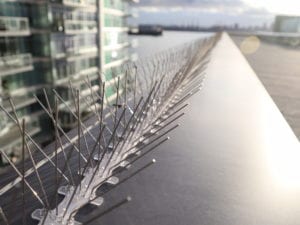
Contact us at 1- 877– 4– NO-BIRD, (604) 585-9279 or visit our website at www.pigeonpatrol.ca
Bird Gone, Pigeon Gone, Seagull Gone, Pigeon issue, pigeon spikes, 1-877-4NO-BIRD, 4-S Gel, Bird Control, Pigeon Control, bird repellent, Bird Spikes, sonic bird repellent, stainless steel bird spikes, bird spikes Vancouver, Ultra Sonic Bird Control, Bird Netting, Plastic Bird Spikes, Canada bird spike deterrents, Pigeon Pests, B Gone Pigeon, Pigeon Patrol, pest controller, pest control operator, pest control technician, Pigeon Control Products, humane pigeon spikes, pigeon deterrents, pigeon traps, Pigeon repellents, Sound & Laser Deterrents, wildlife control, raccoon, skunk, squirrel deterrent, De-Fence Spikes, Dragons Den, Canada bird spikes, Canada pigeon, pigeon control, pigeon patrol, pigeon. Kill pigeons, crow, starling
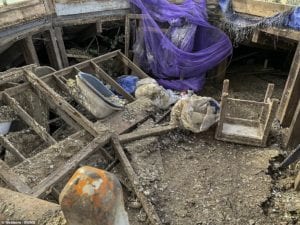
by Pigeon Patrol | Feb 5, 2020 | 4-S Gel Bird repellent, Animal Deterrent Products, Bird Deterrent Products, Bird Netting, Bird Spikes, Pigeon Patrol's Services, Pigeon Spikes, Pigeons in the News, UltraSonic Bird Control
Newcastle Disease
What is Newcastle disease and what causes it? Newcastle disease is a contagious viral disease of birds and considered one of the most important poultry diseases worldwide. The disease can vary from mild to severe. A highly contagious and severe form of the disease, called exotic Newcastle disease (END), is so deadly that many birds die suddenly without showing any signs of disease. What animals get Newcastle disease? Both domestic and wild birds can be affected by Newcastle disease. Chickens are very susceptible to the disease. Turkeys, ducks, geese, as well as parrots, pigeons and wild cormorants can also get END. How can my animal get Newcastle disease? Newcastle disease is spread by direct contact with the droppings or respiratory discharges of infected birds. The virus can live for a long time in the environment and can be spread by objects (fomites), such as shoes, clothing, and equipment, that have become contaminated by infected birds. Outbreaks have occurred from the illegal imports of exotic birds. How does Newcastle disease affect my animal? Newcastle disease in birds can vary from no signs of illness to sudden death. Affected birds may have coughing, sneezing, nasal discharge, depression, and diarrhea. Chicken flocks may have a sudden decrease in egg production or produce thin shelled eggs. Signs of severe illness include swelling of the tissues of the head, muscle tremors, drooping wings, twisted head, circling, paralysis or sudden death. Can I get Newcastle disease? Yes. Infection is rare and usually very mild. People in direct contact with infected poultry or other birds can get conjunctivitis (swelling and reddening of the tissues around the eyes. Poultry crews and laboratory workers would be at the greatest risk for potential exposure to the virus during their work. No human cases of Newcastle disease have occurred from eating poultry products. Who should I contact, if I suspect Newcastle disease? In Animals – Contact your veterinarian immediately. Exotic Newcastle disease is not currently found in the U.S.; suspicion of the disease requires immediate attention. In Humans – Contact your physician. Tell him or her you have been in contact with birds with Newcastle disease. How can I protect my animals from Newcastle disease? Prevent your birds from becoming exposed to infected birds. Biosecurity measures, such as cleaning and disinfection of bird-housing facilities and equipment is very important. New introductions or birds returning to the farm should be isolated for several weeks before being placed into the flock. A vaccine is available for birds and is routinely used in poultry flocks. While this can reduce the severity of the disease, it does not completely prevent infection. How can I protect myself from Newcastle disease? When working with birds or poultry, especially when they are ill, wear protective clothing such as gloves, and safety glasses. Wash your hands after contact with birds or poultry. Avoid touching your eyes until your hands have been washed. People working with the virus in laboratories or on vaccination crews should take extra precautions. 
Source
At Pigeon Patrol, we manufacture and offer a variety of bird deterrents, ranging from Ultra-flex Bird Spikes with UV protection, Bird Netting, 4-S Gel and the best Ultrasonic and audible sound devices on the market today.
Contact us at 1- 877– 4– NO-BIRD, (604) 585-9279 or visit our website at www.pigeonpatrol.ca
Bird Gone, Pigeon Gone, Seagull Gone, Pigeon issue, pigeon spikes, 1-877-4NO-BIRD, 4-S Gel, Bird Control, Pigeon Control, bird repellent, Bird Spikes, sonic bird repellent, stainless steel bird spikes, bird spikes Vancouver, Ultra Sonic Bird Control, Bird Netting, Plastic Bird Spikes, Canada bird spike deterrents, Pigeon Pests, B Gone Pigeon, Pigeon Patrol, pest controller, pest control operator, pest control technician, Pigeon Control Products, humane pigeon spikes, pigeon deterrents, pigeon traps, Pigeon repellents, Sound & Laser Deterrents, wildlife control, raccoon, skunk, squirrel deterrent, De-Fence Spikes, Dragons Den, Canada bird spikes, Canada pigeon, pigeon control, pigeon patrol, pigeon. Kill pigeons, crow, starling
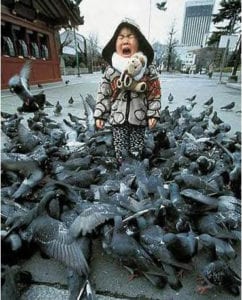
by Pigeon Patrol | Feb 5, 2020 | Animal Deterrent Products, Bird Deterrent Products, Bird Netting, Bird Spike, Bird Spikes, Pigeon Control, Pigeon Droppings, Pigeon Patrol's Services, Pigeon Spikes, UltraSonic Bird Control

Pigeons terrifying child
Bird that scares people, Ornithophobia is the medical term for bird phobias, but many people without a bona fide phobia still fear the creatures. Alfred Hitchcock’s horror film, “The Birds that scares people,” even played into people’s penchant to duck for cover when a bird is around. And of all the bird species, pigeons seem to get the worst rap of them all. Often called “rats of the sky,” pigeons used to be well respected for their homing abilities and were employed during wars to send messages back and forth between troops and base camp. According to HSUS, Hindu and Islamic nations still love these birds, but the tone is different in the United States, where many consider them flying rodents that spread disease and leave bird droppings everywhere they land.
An average pigeon is about 13 inches (32 centimeters) in length and weighs a little less than a pound. This bird is quite adept at living in heavily populated cities and makes its nests in support structures, on building ledges and under bridges. While pigeons and other birds have been known to dive bomb into a person’s head on occasion, you should really only be fearful of flying poop. Pigeon droppings do carry fungi that put humans at risk of contracting diseases, such as histoplasmosis. However, the odds of getting a disease from a pigeon are very low, and the few known cases in which that happened involved pigeon pet owners, not random city slickers.
Source
At Pigeon Patrol, we manufacture and offer a variety of bird deterrents, ranging from Ultra-flex Bird Spikes with UV protection, Bird Netting, 4-S Gel and the best Ultrasonic and audible sound devices on the market today.
Contact us at 1- 877– 4– NO-BIRD, (604) 585-9279 or visit our website at www.pigeonpatrol.ca
Bird Gone, Pigeon Gone, Seagull Gone, Pigeon issue, pigeon spikes, 1-877-4NO-BIRD, 4-S Gel, Bird Control, Pigeon Control, bird repellent, Bird Spikes, sonic bird repellent, stainless steel bird spikes, bird spikes Vancouver, Ultra Sonic Bird Control, Bird Netting, Plastic Bird Spikes, Canada bird spike deterrents, Pigeon Pests, B Gone Pigeon, Pigeon Patrol, pest controller, pest control operator, pest control technician, Pigeon Control Products, humane pigeon spikes, pigeon deterrents, pigeon traps, Pigeon repellents, Sound & Laser Deterrents, wildlife control, raccoon, skunk, squirrel deterrent, De-Fence Spikes, Dragons Den, Canada bird spikes, Canada pigeon, pigeon control, pigeon patrol, pigeon. Kill pigeons, crow, starling
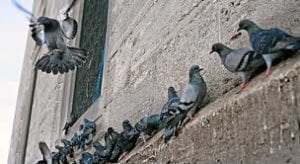
by Pigeon Patrol | Feb 5, 2020 | 4-S Gel Bird repellent, Animal Deterrent Products, Bird Deterrent Products, Bird Netting, Bird Spikes, Pigeon Droppings, Pigeon Patrol's Services, Pigeon Spikes, Pigeons in the News, UltraSonic Bird Control
With a warm spell of weather predicted, staff from Pigeon Patrol Pest Control are gearing up for more calls to deal with the bird they call the ‘flying rat’. 
Pigeons take advantage of the warmer weather to sit on outside ledges and pipework while their fouling fall to the floor below, creating a dangerously slippery surface.
Pigeon Patrol: “With pigeons now breeding four or five times a year, compared to two or three times 20 years ago, their numbers are increasing dramatically. The problem is exacerbated by people feeding them and attracting them into town squares where they are fouling on pavements and buildings.
“Pigeons are the most unhygienic and messy birds and actually carry more diseases than rats. They nest on their poo and attract mites. Nearly all pigeons carry the bird mite – a tiny insect that feeds off the bird, but will also makes humans itch and scratch. Pigeon fouling and nest materials also provide a home for many other insects such as clothes moths, carpet beetle and meal worm beetles.
Most of the pest controllers’ work against pigeons tends to be proofing of buildings and light wells, using a variety of techniques including installing nets, sprung wire systems and bird spike repellents.
Pigeon Patrol explained: “If a slipped tile goes unnoticed on a roof, or the louvers slip on a church bell tower, a pair of pigeons can get in and, in a matter of months, there can be hundreds of pigeons living in the loft space. The floor will soon be covered with fouling up to a foot deep.res further ‘natural-style’ habitats for these descendants of the Rock Dove – ll then have health and safety implications for engineers who come to service the equipment.
“Pigeon poo, when it is wet, is not too much of a danger apart from being slippery and the acidity will, of course, burn car paintwork. But when it is dry, as it often is in a loft space, or below sheltered machinery, then the airborne bacteria can become a real problem – affecting anybody that may be susceptible to asthma and other breathing difficulties.”
When pest controllers are called in, wearing special safety gear, they have to remove the birds, the nests and all loose fouling. The places they have to get to are often difficult to access, very restricted, very hot loft spaces that are about four-feet high – which is one of the reasons they dislike pigeons so much.
Pigeon Patrol Products and Services offers a specialist bird control service for facilities and property management companies in London, Sussex. Surrey and Kent, from the initial survey and specification through to the final proofing solution. As registered waste carriers, Pigeon Patrol can carry out full scale removal of bird fouling, as well as contaminated goods and furniture, from infested properties. As well as the feral pigeon, seagulls are becoming a greater problem for property owners and Pigeon Patrol can also offer advice and solutions for these pests as well.
Some facts about pigeons:
• A pigeon aged between 1 and 30 days is called a squab
• A pigeon’s white feathers have no color pigment
• Pigeons can see in color, but can also see ultra-violet light – a part of the light spectrum that humans cannot see
• Most birds take a sip of water and throw their heads back so it trickles down their throat – pigeons suck up water like straws
• In the 16th century, pigeon poo was a highly valued commodity as it was a source of salt petre or Potassium nitrate – a main ingredient of gunpowder! In France, it was also used to fertilise vineyards
• In India, the pigeon post mail service stopped in 2004
• Cher Ami and GI Joe were two famous war hero pigeons…both saved the lives of many soldiers by carrying important messages across enemy lines
• Young pigeons remain in their nests for up to two months…which is why it is only pest controllers who often get to see them!
• Peregrine Falcons are a natural predator of the pigeon…they can dive at up to 200 miles per hour. A pigeon can dive at about 70 miles an hour.
For more info
At Pigeon Patrol, we manufacture and offer a variety of bird deterrents, ranging from Ultra-flex Bird Spikes with UV protection, Bird Netting, 4-S Gel and the best Ultrasonic and audible sound devices on the market today.
Contact us at 1- 877– 4– NO-BIRD, (604) 585-9279 or visit our website at www.pigeonpatrol.ca
Bird Gone, Pigeon Gone, Seagull Gone, Pigeon issue, pigeon spikes, 1-877-4NO-BIRD, 4-S Gel, Bird Control, Pigeon Control, bird repellent, Bird Spikes, sonic bird repellent, stainless steel bird spikes, bird spikes Vancouver, Ultra Sonic Bird Control, Bird Netting, Plastic Bird Spikes, Canada bird spike deterrents, Pigeon Pests, B Gone Pigeon, Pigeon Patrol, pest controller, pest control operator, pest control technician, Pigeon Control Products, humane pigeon spikes, pigeon deterrents, pigeon traps, Pigeon repellents, Sound & Laser Deterrents, wildlife control, raccoon, skunk, squirrel deterrent, De-Fence Spikes, Dragons Den, Canada bird spikes, Canada pigeon, pigeon control, pigeon patrol, pigeon. Kill pigeons, crow, starling
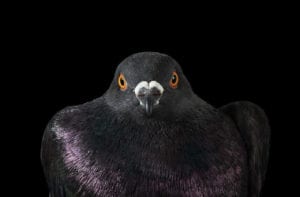
by Pigeon Patrol | Feb 5, 2020 | Animal Deterrent Products, Bird Deterrent Products, Bird Netting, Bird Spikes, Pigeon Control, Pigeon Droppings, Pigeon Patrol's Services, Pigeon Spikes, UltraSonic Bird Control
If you shoo a pigeon, that bird is likely to remember you and know to stay out of your way the next time you cross paths, according to a new study. Researchers found that wild, untrained pigeons can recognize individual people’s faces and are not fooled by a change of clothes.

Previous research in this arena had only focused on the perception abilities of pigeons that were trained in a lab environment, but the new study was conducted on untrained feral pigeons. At a park in Paris, two researchers of similar build and skin color, but wearing different-colored lab coats, fed a group of pigeons.
One researcher ignored the pigeons after feeding them, allowing them to eat the food, while the other was hostile and chased them away. This was followed by a second session when neither researcher chased away the pigeons. [Pretty Bird: Images of a Clever Parrot]
The experiment was repeated several times, with the pigeons continuously recognizing the individuals faces and avoiding the researcher who had first chased them away even when the participant no longer did so. Swapping lab coats during the experiments did not confuse the pigeons, and they continued to stay away from the researcher who had been initially hostile.
“It is very likely that the pigeons recognize the researchers by their faces, since the individuals were both female and of a similar age, build and skin color,” study researcher Dalila Bovet of the University of Paris Ouest Nanterre La Défense said in a statement.
“Interestingly, the pigeons, without training, spontaneously used the most relevant characteristics of the individuals (probably facial traits), instead of the lab coats that covered 90 percent of the body,” Bovet added.
The researchers noted that the birds appear to be able to differentiate between humans and are aware that clothing color is not a good way to tell humans apart. They theorize that this recognition ability may have come about over the long period of association with humans, from early domestication to many years of living in cities.
Previous research supports the findings, as the memory and recognition skills of certain bird species have been demonstrated by other studies. In May 2011, Seoul National University researcher Won Young Lee noticed that when he returned to an area where he had previously installed cameras into the nests of magpies, the birds recognized his face and began dive-bombing him.
A 2009 study showed that jackdaws, which are the smaller cousins of crows and ravens, can interpret human eye cues and even follow human gestures such as pointing. University of Oxford researchers noted that hand-raised jackdaws could find food when a familiar person’s eyes looked back and forth from the food to the bird. The birds also responded when the person pointed to the food’s location. However, the jackdaws took longer to approach food when an unfamiliar person was watching.
“I think they can generalize to human eyes somehow, and interpret human eyes as eyes,” said Auguste Bayern, a cognitive biologist at the University of Oxford and lead author of the 2009 study.
source
At Pigeon Patrol, we manufacture and offer a variety of bird deterrents, ranging from Ultra-flex Bird Spikes with UV protection, Bird Netting, 4-S Gel and the best Ultrasonic and audible sound devices on the market today.
Contact us at 1- 877– 4– NO-BIRD, (604) 585-9279 or visit our website at www.pigeonpatrol.ca
Bird Gone, Pigeon Gone, Seagull Gone, Pigeon issue, pigeon spikes, 1-877-4NO-BIRD, 4-S Gel, Bird Control, Pigeon Control, bird repellent, Bird Spikes, sonic bird repellent, stainless steel bird spikes, bird spikes Vancouver, Ultra Sonic Bird Control, Bird Netting, Plastic Bird Spikes, Canada bird spike deterrents, Pigeon Pests, B Gone Pigeon, Pigeon Patrol, pest controller, pest control operator, pest control technician, Pigeon Control Products, humane pigeon spikes, pigeon deterrents, pigeon traps, Pigeon repellents, Sound & Laser Deterrents, wildlife control, raccoon, skunk, squirrel deterrent, De-Fence Spikes, Dragons Den, Canada bird spikes, Canada pigeon, pigeon control, pigeon patrol, pigeon. Kill pigeons, crow, starling









